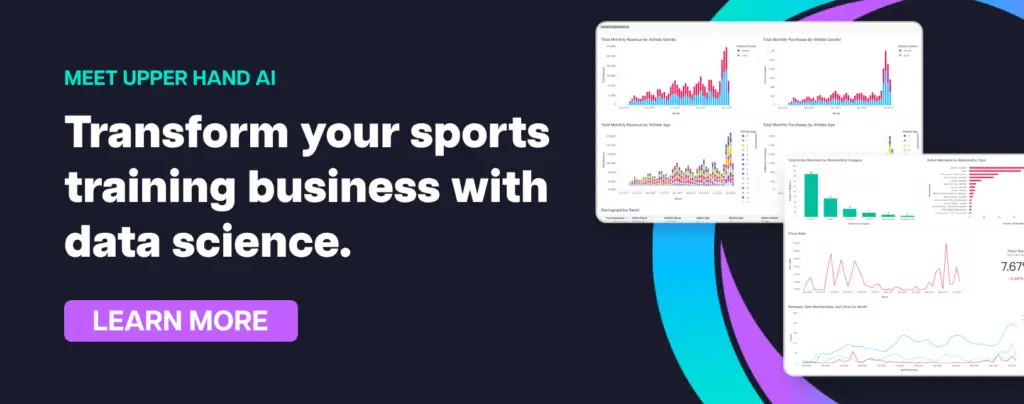Data can be an intimidating thing.
But, for business owners, it is the most critical tool you can leverage to strengthen your decision making.
The more you know about your customers, competitors, and industry, the more confident you can be in making decisions that lead to growth. From identifying changes in the market to developing a long-term business strategy, here are three ways you can use data today to drive innovation at your business.
These strategies were first discussed on an episode of the Sports Innovation Institute Podcast, featuring Upper Hand CEO Kevin MacCauley and Chief Product Officer Myles Grote. Listen to the full episode here.
How Data Drives Decisions
1. Data allows you to uncover market trends
We all want to understand our market. Is interest in your offerings trending up or down? Is there a gap in the market that you are able to fill? Do you need to pivot to explore new revenue opportunities?
Data allows you to uncover industry trends or customer behaviors that will influence business decisions. This could mean introducing a new offering or class at your business. Or, maybe it means identifying a new opportunity to expand your footprint. Kevin MacCauley reflects on his use of data to spark additional market research, and consequently, business opportunities at Upper Hand:
“Going back into the data, we were able to identify a subset of people that kept coming back to buy. This wasn’t typical behavior on a marketplace, so this led us to further discovery to understand why.”
2. Data supports business decisions
Your business is your pride and joy, which can make it hard to make difficult, but necessary, decisions. Data can help give you peace of mind, backing up your decision of when to keep going and when you may need to pivot. Myles Grote emphasized this internal conflict reflecting on two of Upper Hand’s core values: grit and competitive spirit.
“The competitive spirit in you wants to win, and the grittiness in you just wants to keep going with a particular vision. We weren’t ready to give up on our original idea, but ultimately we are big on metrics, and we saw the writing on the wall pretty clearly in terms of opportunity.”
3. Data enables you to strategize for long term growth
Not only does data help you make adjustments in the short term, but it also helps you strategize for long term growth.
Consistent and regular data tracking can provide you with a measurable indicator of performance that allows you to evaluate your progress and strategize for areas of improvement, with the potential to uncover an even greater opportunity to win.
On the Sports Innovation Institute Podcast, Kevin and Myles joined host Travis Smith, who highlighted this approach:
“Upper Hand saw an opportunity to win even more because you saw the future with data, and where the business was going.”
Likewise, for sports and fitness business owners, the ability to analyze data will allow you to make decisions about future offerings or programming that best serve the needs and interests of your clients. Or, perhaps you have goals to expand to additional locations. Data will provide you with the insights to plan for these opportunities in the future.
Ultimately, utilizing data allows you to track measurable goals and make smarter decisions. As a result, you are able to innovate faster, giving your business a competitive edge.
Upper Hand is what studios, gyms, and academies use to grow their business. Get a demo today.





